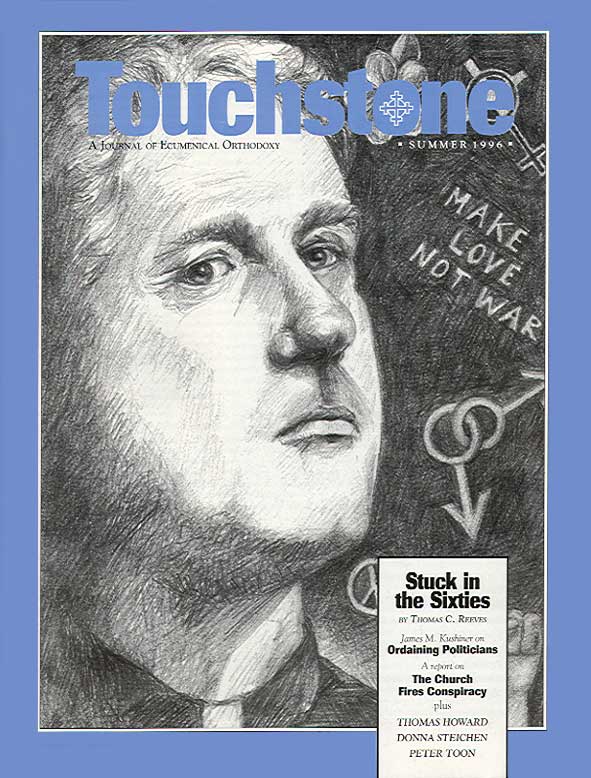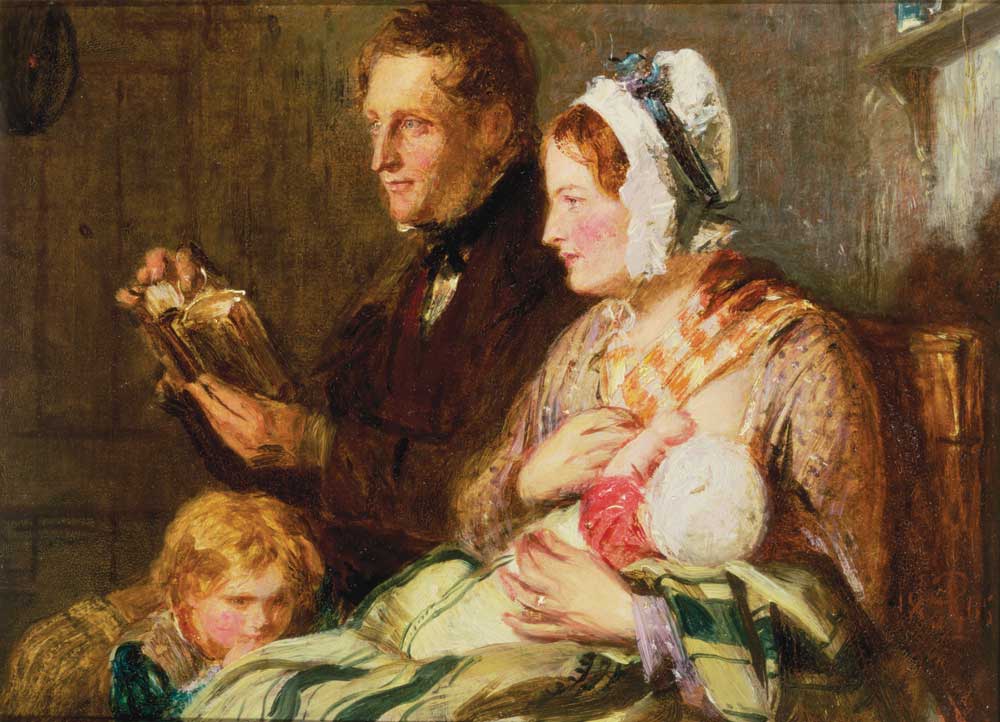Embers of Truth
The Struggle for Faith in Chesterton’s “The Ballad of the White Horse” and Eliot’s “Ash Wednesday”
by Adam Schwartz
In one of the most unfortunate comments yet made about G. K. Chesterton’s writing, Marshall McLuhan maintained that “so impressive is this metaphysical side of Chesterton that it is always embarrassing to encounter the Chesterton fan who is keen about ‘The Ballad of the White Horse’. . .”1 One such embarrassing fan was Christopher Dawson, who wrote to Chesterton in 1932 that when he was an undergraduate, the “‘Ballad of the White Horse’ first brought the breath of life” to the period Dawson was to analyze so brilliantly in The Making of Europe.2 Both W. H. Auden and David Jones, fair poets themselves, also highly praised Chesterton’s poem.3 More recently, his best contemporary critic, Garry Wills, called “The Ballad” a “neglected masterpiece.”4
Such testimony suggests that the “The Ballad” was a more profound poem than McLuhan realized. To understand the spiritual and philosophical depth that motivated this praise that undermines McLuhan’s objection, a comparison of Chesterton’s verse with that of the most metaphysical of modern poets, T. S. Eliot, is helpful, particularly “The Ballad” and Eliot’s “Ash Wednesday.”
Two Purgatorial Poems
Despite Chesterton’s and Eliot’s rather tense personal and professional relationship, they shared a similar intellectual and moral imagination arising from their conversions to Christianity.5 This is particularly evident in “The Ballad of the White Horse” and in “Ash Wednesday,” in which they both outline the state of humanity in the post-Christian world and describe the struggle to attain and retain faith in the midst of it.
Both are purgatorial poems, assessing the effects of sin and pleading for deliverance. In each case, these prayers are answered through the intervention of the Virgin Mary. Finally, both poems end on the note of what Graham Greene describes as the “flame of the Christian religion,” hope.6 Yet this hope is not a facile optimism, for both Chesterton and Eliot acknowledge the struggle against persistent evil that even convinced believers continue to confront.
The Post-Christian Wasteland
Chesterton and Eliot describe the bleakness of a godless world similarly, be it “a lost land / Of boulders and broken men” or residence “among these rocks.”7 Chesterton’s Alfred is “that oft-defeated King / Whose failure fills the land,” while Eliot’s speaker questions why he should even bother to mourn “the vanished power of the usual reign.”8 In both poems, men seek to fill the spiritual vacuum created by the death of God: in Chesterton’s vision “the foes of settled house and creed / Had swept old works away,” while Eliot’s speaker has already succumbed to the temptation to worship strange new gods, “to construct something / Upon which to rejoice.”9
While Alfred and his remnant remain faithful, they are “Like some strange people left on earth / After a judgment day.” Yet it is seemingly a judgment against those who kept the Faith.10 For those demoralized and feeling abandoned, a path of radical self-denial culminating in fatalistic apathy and negation is tempting, as in fact it was to many of Chesterton’s and Eliot’s contemporaries who were drawn to Orientalism and Spiritualism: “Teach us to care and not to care / Teach us to sit still.”11
Enter the Humble Virgin
Into these wastelands, however, comes the Virgin, who, because of her identity as the “Mother of God,” is a symbol of both the life-affirming virtue of hope and the goodness of creation. In both poems she brings a message cloaked in mystery. She tells Chesterton’s Alfred
I tell you naught for your comfort
Yea naught for your desire,
Save that the sky grows darker yet
And the sea rises higher
. . . . . . . . . . .
Do you have joy without a cause,
Yea, faith without a hope?
To Eliot’s seekers the Virgin’s missive is one of “restoring with a new verse the ancient rhyme. Redeem / the time. Redeem / the unread vision in the higher dream.”12 This mystery is an essential part of her mission, for the time can only be redeemed through humility and trust, by recognizing human insufficiency and giving control to God, no matter how hopeless such a faith seems.
Alfred recognizes the realism of such humility, noting that “Pride flings frail palaces at the sky, / As a man flings up sand, / But the firm feet of humility / Take hold of heavy land.” Understanding this dependence upon God promotes radical trust in him, as Alfred acknowledges: “Who would see / Signs, must give all things. Verily / Man shall not taste victory / Til he throws his sword away.”13 This necessary abandonment to God’s will frightens Eliot’s speaker and he wonders whether the Virgin will “pray for those who offend her / And are terrified and cannot surrender.”14
Conversion & Hope
His question is answered affirmatively in both poems. In “The Ballad,” the Virgin’s intervention on Alfred’s side helps effect the conversion of the Danish leader, Guthrum. Like the seeker in “Ash Wednesday,” Guthrum has constructed something upon which to rejoice—his own destructive power: “Wherefore I am a great king, / And waste the world in vain / Because man hath not other power, / Save that in dealing death for dower.” With this power he seeks to fill the gap created by a lack of true faith for, lacking God, one “shall hunger without hope / Even for evil gods.”
Yet his faith in his own power is destroyed by his defeat at the hands of the temporally weaker Alfred. With that loss “Cometh such rending of certainties, / As when one wise man truly sees / What is more wise than he.” Alfred’s prayers and his faithful following of the Virgin, his causeless joy, facilitates the chastening needed to bring the cross to Guthrum and to ensure that England remains a Christian land.15
Similarly in “Ash Wednesday,” the seeker’s prayers, however fearfully and faintly voiced, bring about the needed opening to grace. Whereas in Part I, he said, “Because I do not hope to turn again / Because I do not hope / Because I do not hope to turn” implying a justification for his attitude, by Part VI he has modified his “because” to “although” in each instance, showing he now acknowledges at least the possibility of reformation.16 Against his desire, he hesitantly confesses his sins—“(Bless me father) though I do not wish to wish these things.”17
Finally, whereas the seeker’s earlier wish to care and not to care, to sit still, was one of apathetic passivity, he now conducts the same actions with a transformed attitude of active self-surrender to God, discovering “Our peace in His will.”18 In his despair, against his will, wisdom has come through the awful grace of God. His earlier terror has been eased by the prayers of the Virgin, although it has not been fully relieved. Yet he has begun to turn and thus to hope.
In both poems then, the culminating point is one of hope, as the protagonists are “granted that carelessness about the world which alone reveals the world,” for “to the humbled the Lady makes a sign.”19 Whereas once “every flower, like a flower of the sea, / Smelleth[ed] with the salt of death,” after conversion, “smell renews the salt savour of the sandy earth.”20
Faith Among Thorns
As hopeful as these signs and wonders are, the good seed often falls on thorny ground. As converts, both Chesterton and Eliot recognized that the struggle to live in truth hardly ceases upon professing the Faith. The challenges to faith, especially in a secularized culture, are continuous.
Neither Chesterton nor Eliot forgot what is forgotten by some when the world goes well: the persistence of evil. Alfred prophesies that “In some far century, sad and slow, / I have a vision, and I know / the heathen shall return.” Yet when they come back, they will not be armed with swords, but with scrolls and pens, as “Books be all their eating / And ink be on their hands.” They shall order all things with dead, abstract words and, despite promises of Enlightenment, “By this sign you shall know them, / That they ruin and make dark;” They are “Accursed from the beginning, / By detail of the sinning, / And denial of the sin.” At that time, these “wise men shall govern you / And you shall weep for me.”21
In “Ash Wednesday” this time of lamentations has actually come. Neo-Gnosticism is triumphant, as the rationalism of books and ink has banished the relevance of the eternal and supernatural. Promising progress, this new faith has only produced despair, for a longing persists that cannot be filled temporally or materially. And progressivism itself has been fatally wounded by late-nineteenth century thought and developments, climaxing in the carnage of the Great War.
Hope-Filled Defense
No secular alternative has proved satisfactory due to modernity’s exclusion of the sacred. It is “Because I know that time is always time / And place is always place / And what is actual is actual only for one time / And only for one place,” that “I do not hope to know again / The infirm glory of the positive hour.” We have our inheritance and even if it can be transcended through prayer and positive responses to grace, conversion remains “the time of tension between dying and birth,” into the new life of faith. We must cleave to our intercessors—“Suffer me not to be separated”—for “the weak spirit quickens to rebel” and all tears are not wiped away, not in this life.
Though we cry, it is the conviction that those cries “come unto Thee” that makes the difference between hope and despair.22 Both Chesterton and Eliot affirm that the time will ultimately be redeemed and that it is part of the Christian life to stand in hope-filled defense of those permanent things revealed by faith against “all the stark anarchies and rending negations which rage against it forever.”23 Such a path may often call for countercultural rebellion and invite the ridicule of the majority. But since it is followed out of love for him who is Love, however rock-strewn it may be at times, it is finally traveled with joy: “The men signed of the cross of Christ / Go gaily in the dark/. . . the men that drink the blood of God / Go singing to their shame,” for they have found their peace in his will.24
Embers into Flame
The struggle to find faith and live it in the face of pervasive secularism is a constant theme of both Chesterton and Eliot. In these two poems, we have microcosms of their common concerns about post-Christian culture, the need for vigilance in defending the Faith, and the difficulties and aids believers have as they live out their commitment. As realistic as they are about the agonizing nature of the struggle for faith, they both conclude that its Truth brings the peace which “passeth understanding” and nourishes hope in God’s love.
If such a belief is not among the deepest metaphysical insights, what is? Hence, contrary to Marshall McLuhan’s objection, it is just fine to be “keen” about “The Ballad of the White Horse.” Through Chesterton’s eyes in “The Ballad” and Eliot’s in “Ash Wednesday,” we may see the truth like fire and, by rekindling its sacred embers in modern life, we may ignite that flame of the Christian religion and be set free. •
Notes:
1. Marshall McLuhan, “Introduction,” to Hugh Kenner,
Paradox in Chesterton, (Sheed and Ward, 1947), p. xix.
2. Christopher Dawson letter to Chesterton of June 1, 1932. A copy of
this letter appeared in The Chesterton Review, May 1983, p. 136.
3. For Jones’s praise, see Thomas Dilworth’s review of William
Blissett, The Long Conversation: A Memoir of David Jones, (Oxford,
1981), in The Chesterton Review, November 1983, pp. 376-77. For Auden,
see W. H. Auden, “The Gift of Wonder,” in John Sullivan, ed.,
G. K. Chesterton: A Centenary Appraisal, (Paul Elek, 1974), p. 74.
4. Garry Wills, “A Chesterton for the Religious Right,”
The Christian Century, May 16–23, 1990, p. 532.
5. For example, Eliot told David Jones that he thought “Chesterton
was like a cabman on a cold night, thumping himself to keep warm.” Blissett,
p. 109. For his part, Chesterton responded to Eliot’s “The Hollow
Men” in this way: “I knew that the world was perishable and would
end, but I did not think it would end with a whimper, but, if anything, with
a trump of doom . . .
Some sneer; some snigger, some simper;
In the youth where we laughed, and sang.
And they may end with a whimper
But we will end with a bang.”
As quoted in Maisie Ward, Gilbert Keith Chesterton, (Sheed and Ward,
1943), p. 644.
6. Greene quoted in Penelope Gilliatt, “The Dangerous Edge,”
in Henry Donaghy, ed. Conversations With Graham Greene, (University
Press of Mississippi, 1992), p. 147.
7. “The Ballad of the White Horse”(1911), Collected
Poems of G. K. Chesterton, (Muethen Press, 1933), p. 241. “Ash
Wednesday”(1930), Selected Poems, (Harcourt, Brace, and World,
1936), p. 93.
8. Chesterton, p. 239. Eliot, p. 83.
9. Chesterton, p. 245. Eliot, p. 83.
10. Chesterton, p. 225.
11. Eliot, p. 84.
12. Chesterton, p. 233. Eliot, p. 88.
13. Chesterton, pp. 269, 278.
14. Eliot, p. 91.
15. Chesterton, pp. 253, 254, 302.
16. Eliot, p. 83 (emphasis added).
17. Ibid., p. 92.
18. Ibid., p. 93.
19. Garry Wills, Chesterton: Man and Mask, (Sheed and Ward,
1961), p. 140. Russell Kirk, Eliot and His Age, (Sherwood, Sugden,
and Co., 1984), p. 179.
20. Chesterton, p. 254. Eliot, p. 92.
21. Chesterton, pp. 272, 311, 313.
22. Eliot, pp. 83, 92, 93.
23. Chesterton as quoted in Wills, Man and Mask, p. 230.
24. Chesterton, “Ballad,” p. 232.
Adam Schwartz is Assistant Professor of History at Christendom College.
subscription options
Order
Print/Online Subscription

Get six issues (one year) of Touchstone PLUS full online access including pdf downloads for only $39.95. That's only $3.34 per month!
Order
Online Only
Subscription

Get a one-year full-access subscription to the Touchstone online archives for only $19.95. That's only $1.66 per month!
bulk subscriptions
Order Touchstone subscriptions in bulk and save $10 per sub! Each subscription includes 6 issues of Touchstone plus full online access to touchstonemag.com—including archives, videos, and pdf downloads of recent issues for only $29.95 each! Great for churches or study groups.
Transactions will be processed on a secure server.
more from the online archives
calling all readers
Please Donate
"There are magazines worth reading but few worth saving . . . Touchstone is just such a magazine."
—Alice von Hildebrand
"Here we do not concede one square millimeter of territory to falsehood, folly, contemporary sentimentality, or fashion. We speak the truth, and let God be our judge. . . . Touchstone is the one committedly Christian conservative journal."
—Anthony Esolen, Touchstone senior editor









